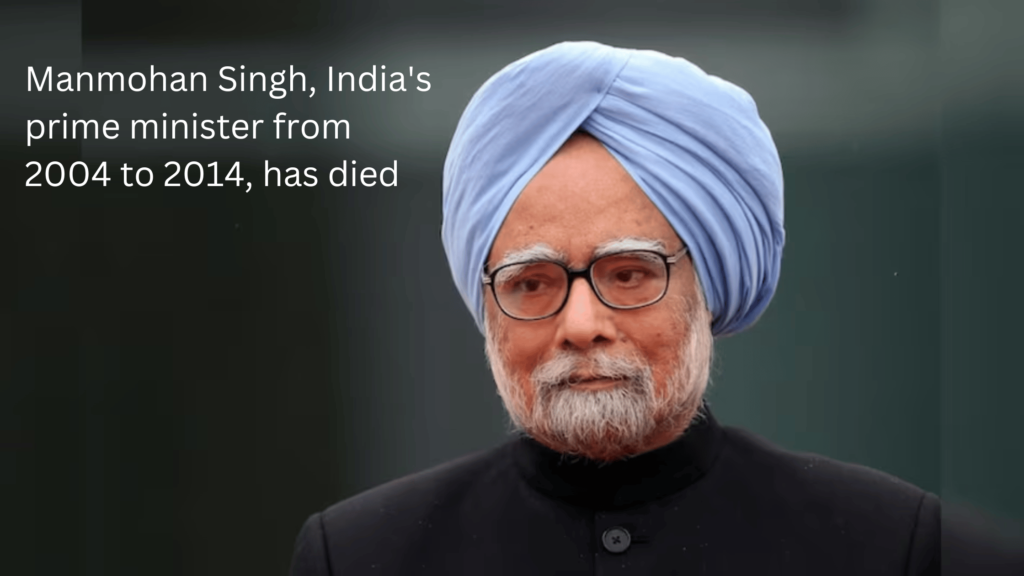Manmohan Singh, the first member of India’s minority Sikh faith to serve as prime minister, passed away in New Delhi on Thursday at the age of 92. Although he was a well-known economist and the father of economic reforms in India, many people, including some members of his own party, the Indian National Congress, thought he was a weak leader.
Prime Minister Narendra Modi wrote, “India mourns the loss of one of its most distinguished leaders, Dr. Manmohan Singh Ji,” on X. He became a recognised economist after rising from modest beginnings. He worked hard to make people’s lives better while serving as our prime minister.
Political analysts claim that Singh’s tenure as finance minister in the early 1990s was more important than his tenure as prime minister from 2004 to 2014. His policies at the time put India on the route to globalisation and economic liberalisation.
In his memoir A Promised Land, former U.S. President Barack Obama characterised Singh as “smart, considerate, and scrupulously honest.”
Singh was born on September 26, 1932, in the present-day Pakistani hamlet of Gah. When Great Britain split the subcontinent in 1947 into independent India and Pakistan, a country with a majority of Muslims, his family moved east. Hundreds of thousands of people, including Singh’s grandfather, were slaughtered by sectarian bloodshed and mass migration brought on by the split.
Singh, an economist with a degree from Oxford, created one of the most radical budgets in Indian history in 1991, opening the nation to the free market.
“Make it plain to everyone on the planet. During his budget speech, Singh declared, “India is now wide awake.”
According to Rajesh Chakrabarti, a specialist in finance and public policy, “the budget declaration was a shocker because it nearly turned on its head most of what was the received economic wisdom of the day.”
According to Chakrabarti, India’s economy was socialist, controlled by the public sector, and import-restricted until 1991. The situation was severe when Singh was appointed finance minister. India was experiencing a serious difficulty with its balance of payments.
“We were importing far, far more than what we were exporting, and our foreign exchange reserves had touched a low,” states Chakrabarti. “India had to actually ship out gold — that means physically putting its gold reserves in ships and sending them to [banks in] London, to get money for running the economy.”
Singh’s historic budget eliminated the Permit Raj, a convoluted web of rules and red tape that deterred private investment, reduced import taxes, and opened India’s economy to foreign direct investment.
Singh was pushed into the spotlight once more in 2004 when Sonia Gandhi, the Congress party’s Italian-born matriarch, appointed Singh to the top position after she declined to become prime minister after the party’s resounding victory.
However, detractors referred to him as the Gandhis’ “puppet,” made fun of his reserved demeanour, and claimed he lacked persuasive abilities.
Rasheed Kidwai, the author of a book about the Congress party, claims that humility was both his strength and, to some extent, his weakness because he was unable to perform for the audience.
Nevertheless, Kidwai claims that he led India through a number of internal and foreign problems.
“When the world economy tottered in 2008, India stood firmly,” according to him. During Singh’s tenure, “there was no confrontation with difficult neighbours like Pakistan and China,” even though Pakistani militants carried out a devastating terrorist attack in Mumbai in 2008.
Singh was very effective in international policy, according to Kidwai. He asserts, “He was not one-dimensional,” “[Singh] had very good relations and functional ties with Iran, and at the same time he was highly welcomed in Saudi Arabia.”
India made several strides towards better ties with the United States under Singh’s direction. Notably, the two nations reached an agreement to abolish a nuclear commerce ban that had been in place for decades. Singh’s other accomplishments were launching a social welfare program that ensured jobs in rural regions and boosting India’s economy.
However, corruption allegations plagued his second term, and his Congress party suffered its worst-ever loss in the 2014 national elections. The Hindu nationalist Bharatiya Janata Party won those elections handily, and Singh decided not to run for office again. In the corruption scandals, he was cleared of any involvement.
Singh and his family remained in Delhi when Singh left the job. His wife, historian Gursharan Kaur, and their three daughters survive him.
Singh was one of India’s most elegant prime leaders, according to Chakrabarti. “I don’t think even his worst critics will ever have anything but respect for the man,” he asserts.
“My life and tenure in public office are an open book,” Singh stated in his 2014 farewell speech while donning his trademark light-blue Sikh turban. “I have had the honour of serving this country. Nothing more is possible for me to ask for.”



